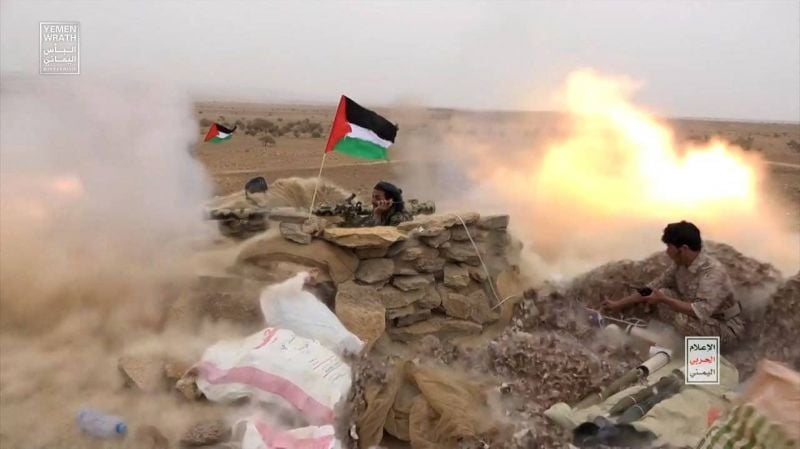
Houthi fighters fire anti-tank grenades during a military maneuver near Sanaa, Yemen, Oct. 30, 2023. (Credit: Houthi Media Center/Reuters)
Commonly known as the Houthis, the Yemeni rebel group, supported by Tehran, fired missiles towards Israel on Tuesday Oct. 31, claiming to respond to the "Israeli-American aggression" against Palestinians in Gaza, citing "the weakness of official Arab regimes and their collusion with the Israeli enemy." This rhetoric echoes that of the Islamic Republic of Iran, which has been threatening regional escalation since the beginning of the war on Oct. 7 through the groups of the "Axis of Resistance."
Here are the key points:
- Two days after the tragedy at al-Ahli Hospital in the city of Gaza on Oct. 17, strikes launched from Yemen and intercepted by a US warship were attributed to the Houthis, although not claimed at that time. They were potentially heading "towards targets in Israel," said the Pentagon spokesperson.
- On Tuesday Oct, 31, the Houthis claimed responsibility for launching a series of ballistic and cruise missiles towards Israel.
- The Israeli army warned on Wednesday that it had strengthened its air defenses in the Red Sea. Missile-launching naval vessels were deployed following attacks from Yemen.
- Daniel Hagari, spokesperson for the Israeli army, threatened to respond to these attacks, which Israel considers to be directed by Tehran, as reported by the Times of Israel.
- Wednesday morning, a new projectile was intercepted near the city of Eilat, at the southern tip of Israel, bordering the Red Sea, according to the Israeli newspaper.
- The Israeli army claims to have intercepted a long-range surface-to-surface missile using its Arrow defense system. It was the first operational use of this system since the war began. American news website Axios also reports that two Israeli fighter jets destroyed two Houthi cruise missiles over the Red Sea.
Context:
- Shortly after the outbreak of the war between Israel and Hamas, the Americans were quick to deploy a significant arsenal in the region, including posting three aircraft carriers in the Mediterranean. They claimed the presence of this arsenal was for deterrence purposes.
- On Oct. 10, three days after the start of the war, the leader of the Yemeni rebels, Abdel-Malek al-Houthi, declared that if the United States directly intervened in the conflict, his group would respond by firing drones and missiles and conducting other military operations.
- These statements echo those coming from Iranian officials since the beginning of the war. On Oct. 27, Foreign Minister Hossein Amir-Abdollahian referred to his meetings with "the officials of the resistance in Lebanon and also the Palestinian groups," stating that "they have their finger on the trigger." On Tuesday, Oct. 31, he reiterated by pointing out that pro-Iranian groups could not remain "silent" in the face of the war in Gaza.
- In addition to its operations in the Palestinian enclave, under total blockade since Oct. 9, Israel is already active on another front along the northern borders with Lebanon and Syria, where there have been daily exchanges of fire.
- While claiming decision-making freedom, the Houthis are supported by Iran and belong to the "Axis of Resistance," claiming, among other things, profound hostility towards the "Zionist enemy."
What’s at stake:
- For the Gulf petro-monarchies, the entry of the Houthis into the conflict is a worrisome turn of events. Many, such as the United Arab Emirates and Bahrain, normalized their relations with the Israeli state in 2020, while Saudi Arabia was on the path to do the same before Oct. 7. On Wednesday, Nov. 1, Iran's Supreme Leader Ali Khamenei urged "Muslim governments" to block "exports of oil and food to the Zionist regime and not to cooperate economically" with Israel. The following day, the Bahraini Parliament announced it was severing economic relations with Israel and recalling the country's ambassador, a decision not currently binding for the kingdom's government.
- If the Gulf were to become inflamed by further aggressions, the stability of oil markets could be severely disrupted. The World Bank warned on Oct. 30 that an escalation of the conflict could push oil prices to $157 per barrel in the worst-case scenario. This scenario could prompt some actors, such as the United States, to push for an easing of tensions.
- Houthi attacks de facto open a third front against Israel, requiring the Israeli state to mobilize resources that could be used elsewhere. On Oct. 21 in L’Orient-Le Jour, Fabian Hinz, expert on arms proliferation in the Middle East explained the nuances of the situation, saying that "while being a good launching platform, Yemen is not the best, due to its geographical distance and limited capabilities that could be effectively deployed against Israel, which has powerful defense systems, especially in the air.”
This article was originally published in French in L'Orient-Le Jour. Edited in English by Amelia Hankins.